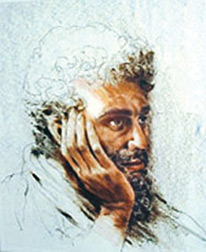Man, the measure of all things
 The civilised world owes a great debt to ancient Greece which
produced a string of great philosophers who professed divergent views on
life and the universe. Although some of their views have been challenged
or undergone drastic changes over the past few centuries, Greek
philosophy cannot be dismissed in toto. The civilised world owes a great debt to ancient Greece which
produced a string of great philosophers who professed divergent views on
life and the universe. Although some of their views have been challenged
or undergone drastic changes over the past few centuries, Greek
philosophy cannot be dismissed in toto.
Way back in the 5th century BCE, Athens evolved into a prosperous
city State in Greece under the strong leadership of Pericles. According
to historians, he ushered in the “Golden Age” of scholarship and culture
in Greece. It is natural that when a country is prosperous it attracts
travellers from foreign countries. The city remained the cradle of
democracy where people governed themselves on established principles.
There were courts of law to settle disputes sans lawyers to appear for
litigants.
As there were no lawyers to interpret the law, litigants sought the
services of a new breed of advisers. One such notable adviser was
Protagoras who used to teach law and advise people on knotty legal
problems. He is reported to have charged exorbitant fees for giving
advice. However, his approach to legal matters was quite different from
what it is today.
Subjective
His method was to argue a civil case and win it rather than proving a
legal point. He was more inclined to consider the philosophical
implications of what he taught. As a widely travelled and experienced
teacher, Protagoras knew that every argument had two sides. He also knew
that both sides of an argument may be quite valid. He said what you
believe to be true is subjective. His reasoning was new to Greek
philosophy at the time.
|

Many things
prevent knowledge,
including the obscurity
of the subject and the brevity of
human life.
- Protagoras (c.490-420 BCE) |
Protagoras was not much interested in the universe or the existence
of gods. While he considered them to be unknowable, he focused attention
on practical problems that affected man.
There is a story that a man from Sweden visited Athens on a spring
day. He found the weather to be warm. Another visitor who came from
Egypt found the weather to be cold. According to Protagoras, both men
spoke the truth because it depended on perspective and is therefore
relative. Finally, he concluded that man is the measure of all things.
Society
Protagoras rejected the absolute definitions of truth, justice and
virtue. He said they are subjective and relative. What is true for one
person may not be true for another. For him, nothing was inherently good
in itself. It is society that judges what is right for us. This can
differ in another society which interprets what is right in a different
way. Thus, all moral laws are subjective. Even today what they consider
right in certain Middle Eastern countries are roundly condemned by the
civilised world.
Protagoras lived at a time when Sophists held sway in Greece.
Sophists were itinerant teachers who taught law and rhetoric. Although
they were influential at the time, Plato condemned them as rhetoricians
. But Protagoras stood firm in his views that there were no absolutes in
judgements including morality.
Pericles commissioned Protagoras to write the Constitution for his
kingdom in 444 BCE. However, his agnostic views were not favoured by
Pericles. As a result, Protagoras was tried for impiety and some of his
books were burnt in public.
With all such vicissitudes of life Protagoras is acknowledged to be
the greatest Sophist. Even Plato who did not recognise him as a real
philosopher devoted a dialogue for him. In a way, Protagoras was right
in his thinking for most of us consider what we do or believe to be
correct. At the same time we condemn what others do or believe in.
Harsh comment
When Protagoras said, “What is right in one group is wrong in
another,” it drew a harsh comment from John Hospers. He questioned,
“What exactly is a group?” According to Hospers, we are members of
different groups such as our nation, State, city, club, school, church
or fraternity. If most of the members of one group think that certain
act is wrong does it mean it is wrong in all the other groups?
Protagoras is not totally wrong. Some of his views have formed the
basis of certain tenets of modern social science. For instance, our
values are determined by our culture or conditioning. It is impossible
to form a culture free of such conditioning. Sometimes, we condemn
Western culture as decadent. But do we have a aright to pass such
judgements?
Facing imminent death or exile, Protagoras tried to escape on a shop
headed for Sicily. Although the ship was wrecked and Protagoras drowned,
he has left us a wealth of knowledge. |

